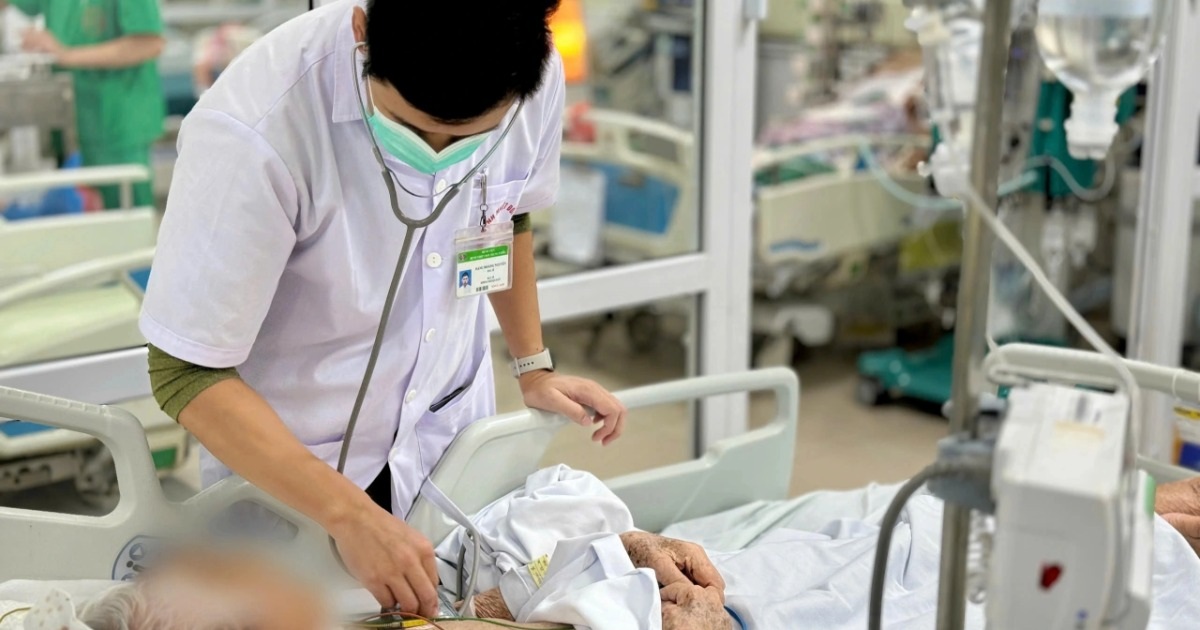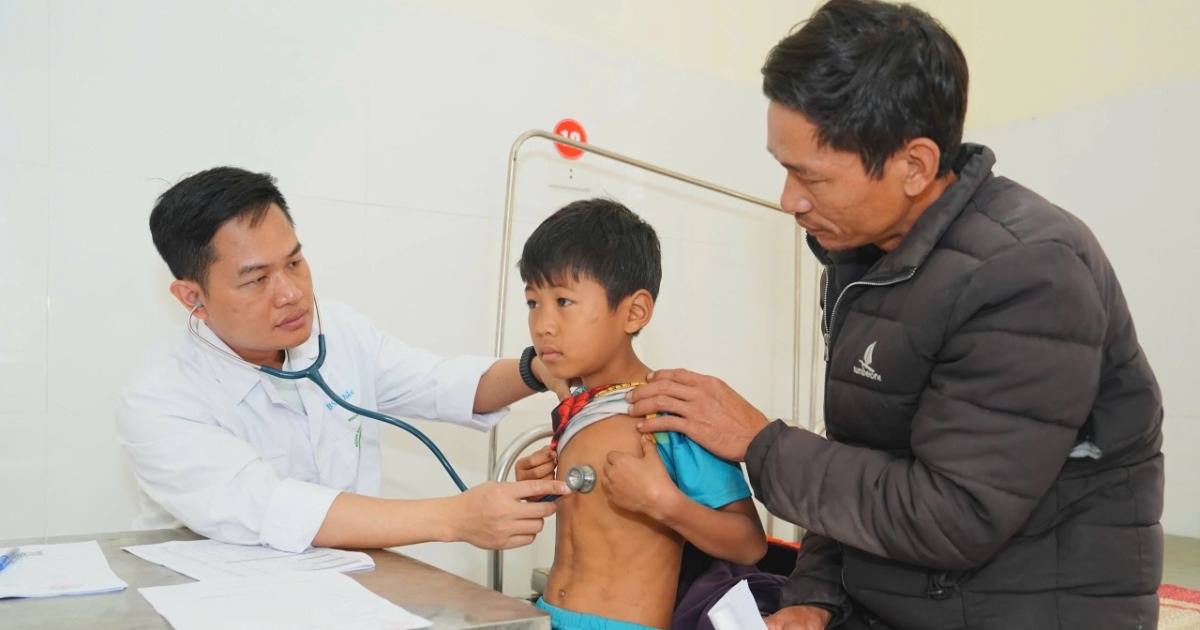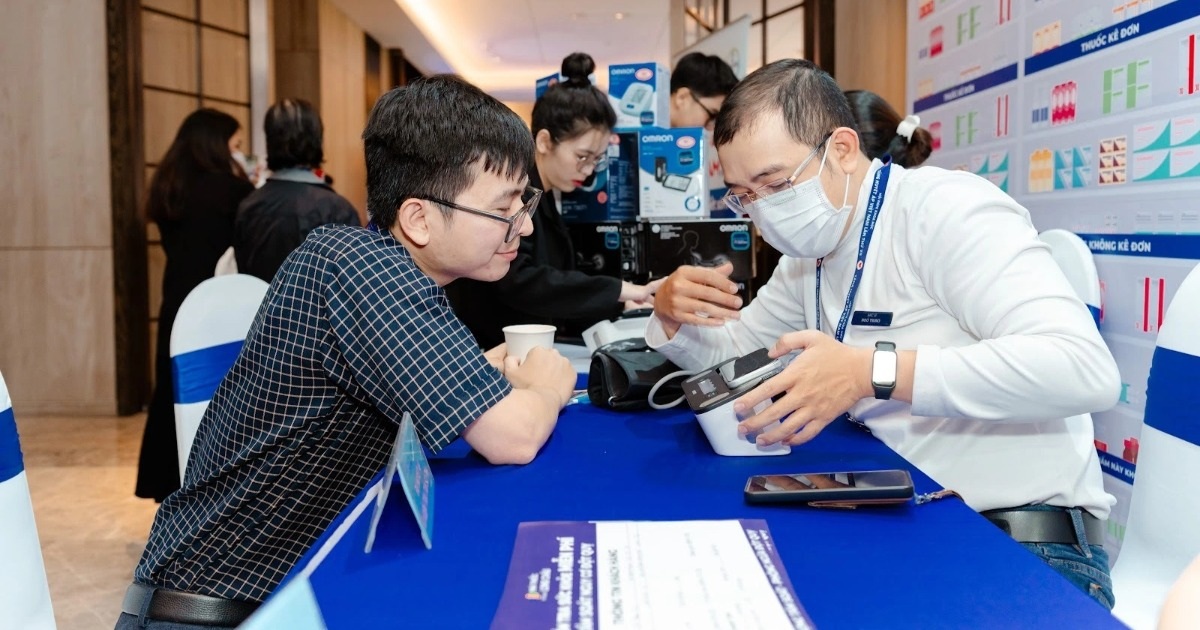Cold Weather: A Threat to Senior Health
Mrs. P.T.M. (90 years old, from Hanoi) was admitted to the hospital by her family in a state of exhaustion, difficulty breathing, mild coughing, and poor appetite. The day before, she had taken a long warm bath in the evening and then slipped and fell in the bathroom. The next morning, family members found her very tired and short of breath, so they immediately took her to the hospital. After examination and tests, doctors diagnosed her with severe pneumonia, requiring intensive treatment and close monitoring.
Another case is Mrs. N.T.L. (94 years old, Hanoi), who was hospitalized with a high fever of 39°C, severe coughing, thick phlegm, and difficulty breathing.
 Elderly patient with severe complications due to cold weather
Elderly patient with severe complications due to cold weather
She had a history of cerebrovascular accident, hemiparesis, and a fractured femoral neck, having been bedridden for over 2 years. Two days before admission, she developed a fever and cough, and fever-reducing medication taken at home provided no relief. Upon arrival at the hospital, doctors noted opaque white phlegm, an SpO₂ level of 85%, and inflammation and pleural effusion in both lungs. She was treated with broad-spectrum antibiotics, bronchodilators, high-flow oxygen support for respiration, and aggressive phlegm aspiration to clear the airway and reduce the risk of respiratory failure.
Dr. Vu Minh Dien – Deputy Head of the Department of General Internal Medicine, National Hospital for Tropical Diseases, stated that when the weather turns cold, the elderly are a high-risk group for illnesses due to reduced resistance and impaired thermoregulation. “Elderly people have weaker immune systems and aged organs, making them susceptible to weather changes. Simply bathing late, encountering cold winds, or experiencing sudden temperature changes can trigger illness,” Dr. Dien emphasized.
According to Dr. Vu Minh Dien, the cold season is when many elderly diseases are prone to recurrence or worsening. Among these, pneumonia is a leading cause of hospitalization and death. Cold, dry air irritates the respiratory mucosa, weakens the cough reflex, and makes phlegm difficult to clear, leading to easy infection. Besides pneumonia, the elderly are also susceptible to cardiovascular diseases such as hypertension, myocardial infarction, and stroke. Cold weather causes blood vessels to constrict, increasing blood pressure and making the heart work harder, which is particularly dangerous for those with underlying cardiovascular conditions, atherosclerosis, or diabetes.
Additionally, musculoskeletal diseases often worsen in cold weather. Poor blood circulation leads to stiff, aching joints, and many individuals experience cramps and muscle spasms at night. Some cases also involve cold-related accidents, such as slips and falls in the bathroom, hypothermia, or carbon monoxide poisoning from improper heating.
Proactive Prevention for Cold Season Health Protection
According to Dr. Dien, the elderly need special attention during winter. “Keeping warm, eating adequately, sleeping well, and exercising appropriately are simple yet very effective measures to prevent illness,” Dr. Dien advised.
Specifically, the elderly should:
- Keep the entire body warm, especially hands, feet, neck, and chest.
- Avoid bathing late and going out early when the weather is still cold.
- Eat a nutritious diet, supplementing with green vegetables and fruits, and drinking enough warm water.
- Maintain light indoor exercise to improve blood circulation.
- Get vaccinated against influenza and pneumococcal disease as recommended.
- Regularly monitor blood pressure and blood sugar, and take medication as prescribed.
“When experiencing symptoms such as difficulty breathing, prolonged coughing, fever, or fatigue, it is crucial to seek medical attention early and absolutely avoid self-medicating, as illnesses can progress rapidly and severely in the elderly,” Dr. Dien emphasized.



